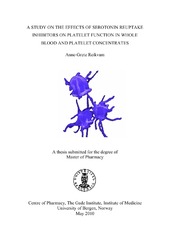A study on the effects of serotonin reuptake inhibitors on platelet function in whole blood and platelet concentrates
Master thesis
Permanent lenke
https://hdl.handle.net/1956/4221Utgivelsesdato
2010-05-19Metadata
Vis full innførselSamlinger
Sammendrag
Background: Several studies report that patients who use serotonin reuptake inhibitors (SRIs) to treat depression may have increased risk of bleeding, particularly from the gastrointestinal tract. This may be related to low concentrations of serotonin in platelets. Several blood banks defer SRI users from platelet donation. Search in Medline have not revealed any study clarifying the effect of SRIs on platelets stored for transfusion. Methods: We conducted a prospective blinded randomized control study in blood donors using SRI (n=8) and in donors without medication (n=10). The test group consisted of 4 men and 4 women, and the median age was 40 years (range: 29-54 years). The control group consisted of 3 women and 7 men, and the median age was 39 years (range: 21-54 years). Platelet function was compared in whole blood and in platelet concentrates stored for up to five days. In addition, quantitative analyses of serotonin, tryptophan and tryptophan metabolites were undertaken. Results: Light transmission aggregometry, trombelastography and flow cytometric analysis of glycoprotein expression did not detected altered platelet function in blood donors using SRI. Routine tests for platelet confirmed high quality of platelet concentrate obtained from donors using SRIs. Blood donors using SRI have markedly lower platelet serotonin compared to blood donors without medication. Conclusion: The results from our pilot study indicate that patients using SRIs do not have altered platelet function and can be accepted as platelet donors. Our results are limited to platelets stored for 5 days and for low doses of SRI. There is a need for larger studies to finally clarify the influence of SRI on platelets stored transfusion.
Utgiver
The University of BergenOpphavsrett
Copyright the author. All rights reservedThe author
